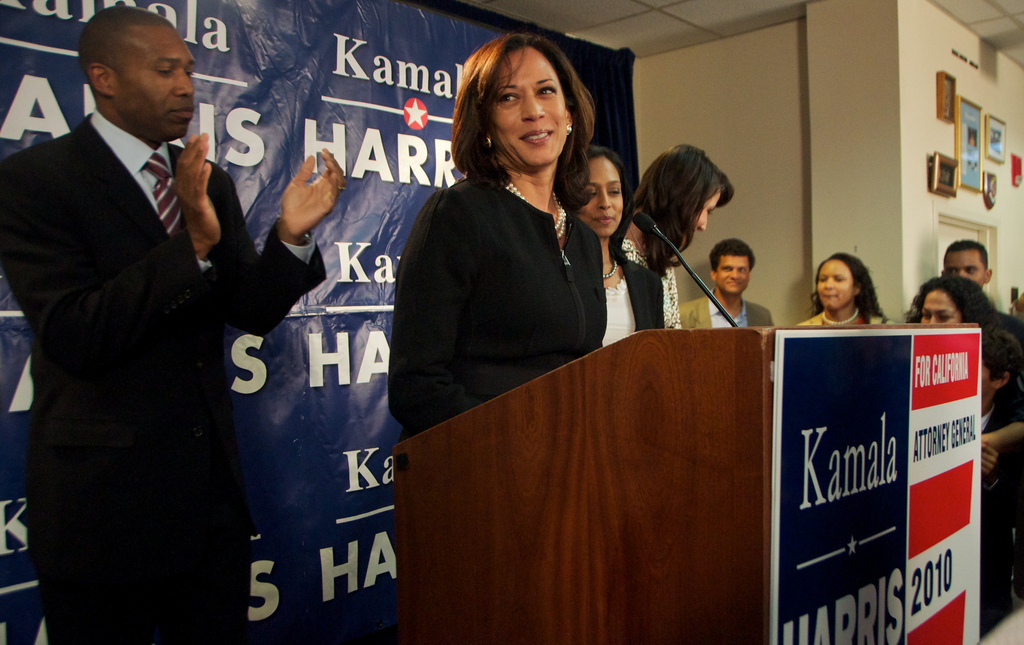California will remain Democratic in next Senate election

California Attorney General Kamala Harris is the current frontrunner to replace U.S. Sen. Barbara Boxer. (Creative Commons photo by Steve Rhodes via Flickr)
By Chris Campbell
Feb. 4, 2016 9:53 a.m.
We all know the 2016 presidential contest is a big deal. Yes, I spent my Monday night with the Iowa caucuses, watching the first step of choosing the next leader of the free world as if it were a pro wrestling tournament.
So I’m not surprised that news coverage has been dominated by the Donald Trumps and Ted Cruzes of the world. What I am surprised about is the relatively sparse attention given to another competitive primary – the U.S. Senate race right here in California.
First, the basic facts. The contested Senate seat is currently held by Democrat Barbara Boxer, but she’s retiring next year, making this election an open seat contest. On the Democratic side, there are two major candidates running to succeed her: California Attorney General Kamala Harris and U.S. Rep. Loretta Sanchez of Santa Ana. Likewise, there are three main Republicans in the contest.
But let’s be honest, with California’s open primary rules, the Republicans don’t really matter.
Since 2011, California has run nonpartisan blanket primaries for their statewide races, which means every candidate runs in a single primary in which anybody can vote. In other words, we can look forward to a five-person free-for-all emerging in the coming months. Here’s the kicker – there may be two Democrats on the general election ballot this fall. Polling for this race shows Harris leading her closest rival with a little under 30 percent of the vote. But her closest rival is Sanchez, a fellow Democrat, who’s supported by about 15 percent of voters. None of the Republicans are currently above 10 percent.
Harris is starting out with a distinct advantage. She’s the only one of the candidates who has won statewide election before, giving her solid name recognition and a statewide network of supporters. Harris is a solid liberal and an ideologically close fit for the state. She supports gun control, abortion rights, climate change measures and has declared that illegal immigrants “are not criminals.”
As the second fiddle in this race, Sanchez is positioning herself as a more moderate alternative to Harris. The Santa Ana Democrat has run up a fairly liberal record during her House tenure. That said, she has taken some decidedly less-than-liberal positions on border security and national security, both of which she’s decided to emphasize during her run.
But her left-of-center orientation hasn’t stopped her from making some gaffes worthy of the Donald himself, like when she suggested that 5 to 20 percent of Muslims are seeking a caliphate, or when she greeted a group of Indian Americans with a Native American war cry. And that’s leaving out her quirky Christmas cards, which my family receives every winter. They’re pretty entertaining.
The prospect of a Harris-Sanchez matchup might not hold, especially in a race where 40 percent of the electorate is still undecided. But California is a heavily Democratic state – one of only seven to currently have a Democratic governor, senate and state assembly. Only 28 percent of voters are registered Republicans. Even if Republicans manage to coalesce around a single candidate, it’s not too out there to suggest a Democrat versus Democrat matchup this November.
In this situation, Sanchez may find a narrow path to victory – if she can establish a coalition of moderate Democrats, independent voters, and some of the more moderate Republicans. It’ll still be tough. Harris leads the field of candidates in fundraising and name recognition. But a Harris victory wouldn’t be a foregone conclusion.
The only hope for a Republican to advance to the general election is to convince his rivals to drop out. So far, no one’s been willing to do so. But as this race picks up steam and more voters start paying attention, we can expect Republicans to rally around one candidate, threatening Sanchez’s second-place standing in the polls.
But no matter who makes the general election ballot in November, I’m calling it now: California’s next Senator will be a Democrat. The state’s demographics and party registration numbers make it unfriendly terrain for any Republican. In 2010, Boxer bested her strong Republican rival Carly Fiorina 52 percent to 42 percent in what was otherwise a banner year for Republicans. And 2012 was just a blowout. Democratic Senator Dianne Feinstein crushed her Republican challenger 63 percent to 38 percent. There’s little indication that this year will be any different.
This is definitely a race to watch in the coming months, and you can expect the dialogue between Harris and Sanchez to become increasingly contentious as the June 3 primary approaches. After all, sometimes the best drama happens right in your own backyard.

